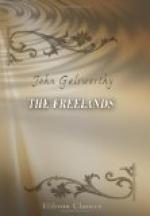When, two hours later, he entered the kitchen at home, of the company assembled Frances Freeland alone retained equanimity enough to put up her face to be kissed.
“I’m so thankful you’ve come back in time to see your uncles, darling. Your Uncle John thinks, and we all agree, that to encourage those poor laborers to do things which are not nice is— is—you know what I mean, darling!”
Derek gave a bitter little laugh.
“Criminal, Granny! Yes, and puppyish! I’ve learned all that.”
The sound of his voice was utterly unlike his own, and Kirsteen, starting forward, put her arm round him.
“It’s all right, Mother. They’ve chucked me.”
At that moment, when all, save his mother, wanted so to express their satisfaction, Frances Freeland alone succeeded.
“I’m so glad, darling!”
Then John rose and, holding out his hand to his nephew, said:
“That’s the end of the trouble, then, Derek?”
“Yes. And I beg your pardon, Uncle John; and all—Uncle Stanley, Uncle Felix; you, Dad; Granny.”
They had all risen now. The boy’s face gave them—even John, even Stanley—a choke in the throat. Frances Freeland suddenly took their arms and went to the door; her other two sons followed. And quietly they all went out.
Derek, who had stayed perfectly still, staring past Nedda into a corner of the room, said:
“Ask him what he wants, Mother.”
Nedda smothered down a cry. But Kirsteen, tightening her clasp of him and looking steadily into that corner, answered:
“Nothing, my boy. He’s quite friendly. He only wants to be with you for a little.”
“But I can’t do anything for him.”
“He knows that.”
“I wish he wouldn’t, Mother. I can’t be more sorry than I have been.”
Kirsteen’s face quivered.
“My dear, it will go quite soon. Love Nedda! See! She wants you!”
Derek answered in the same quiet voice:
“Yes, Nedda is the comfort. Mother, I want to go away—away out of England—right away.”
Nedda rushed and flung her arms round him.
“I, too, Derek; I, too!”
That evening Felix came out to the old ‘fly,’ waiting to take him from Joyfields to Becket. What a sky! All over its pale blue a far-up wind had drifted long, rosy clouds, and through one of them the half-moon peered, of a cheese-green hue; and, framed and barred by the elm-trees, like some roseate, stained-glass window, the sunset blazed. In a corner of the orchard a little bonfire had been lighted, and round it he could see the three small Trysts dropping armfuls of leaves and pointing at the flames leaping out of the smoulder. There, too, was Tod’s big figure, motionless, and his dog sitting on its haunches, with head poked forward, staring at those red tongues of flame. Kirsteen had come with him to the wicket gate. He held her hand long in his own and pressed it hard. And while that blue figure, turned to the sunset, was still visible, he screwed himself back to look.




